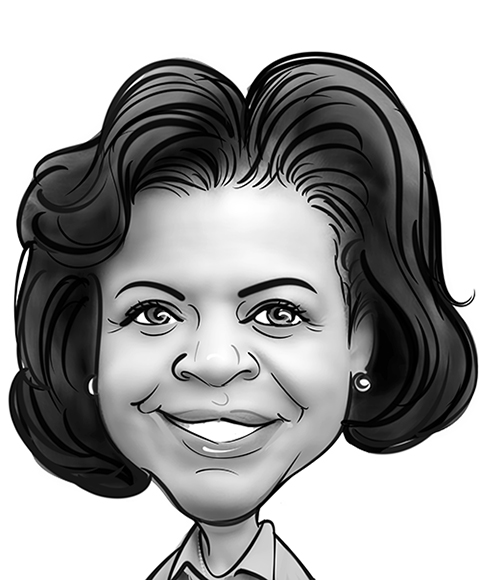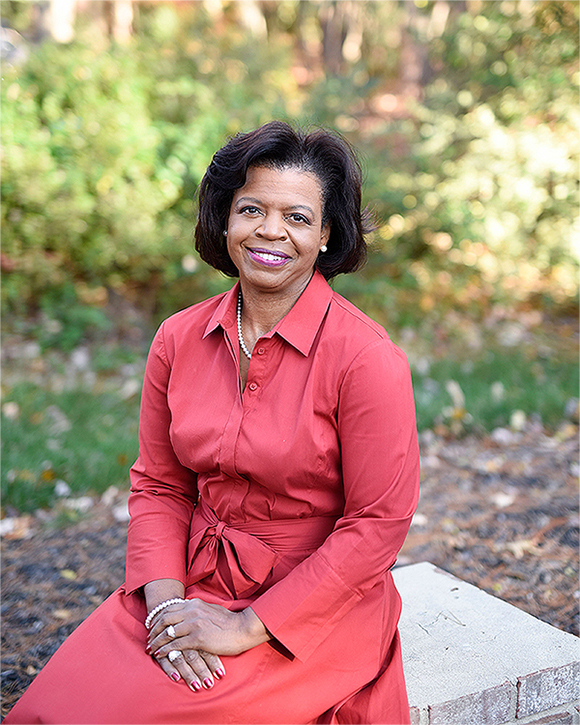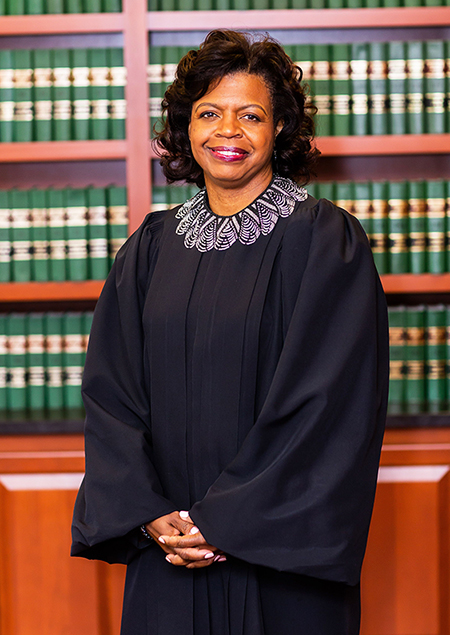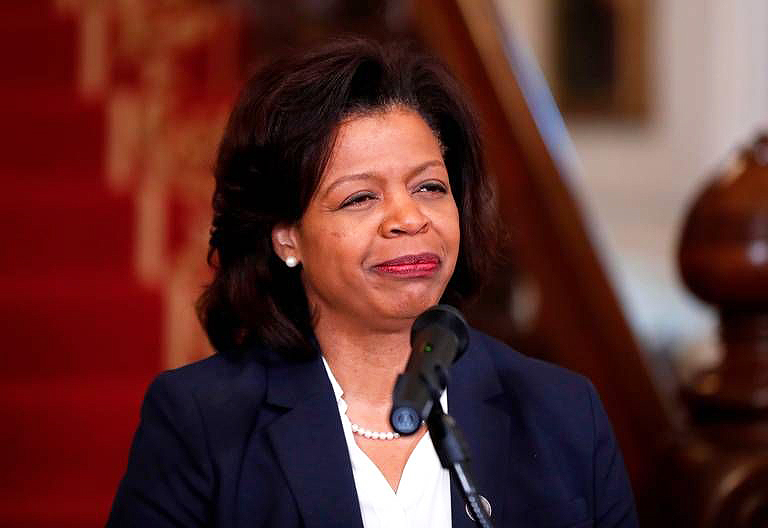Transcribed interview by Visual Collaborative
A conversation with Ade Olufeko
July 2020 16 min read

Cheri Beasley currently serves as the Chief Justice of the North Carolina Supreme Court in the United States. She has served in numerous positions to include the North Carolina Court of Appeals and as a District Court Judge. As the main feature in our Visual Collaborative Grand Masters interview series, Chief Justice Beasley discusses her role in service, background, current affairs and shares a vantage point about the importance of diversity, including other black women in similar positions. We finally discuss the forthcoming elections, her awareness, gratitude, and connection internationally.
(Ade) All over the world, as well as in the United States, including North Carolina, statues and symbols of oppression are being pulled down, and now about portraits in the courthouse, what kind of judicial obstructions happen, and how does this affect your role as Chief Justice?
(Chief Justice Cheri) The court in December 2018 appointed an advisory committee on portraits to evaluate what should happen with the portraits and to also take public comment, which is happening this summer. The committee should have a recommendation to the court by December, I believe. The reality is that this year was a very different world, and so many of these are coming down, I can look out my window and see in Capital Square, where the confederate monuments came down. So it is a very different world, the only thing that has to happen is that we have to decide to tell history in a realistic and meaningful way. I don’t know if the portraits will come down or not, but honestly, even if they remain, as symbols of success and progress for the State, it is a disingenuous way to tell the State’s story.
(Ade) What are your thoughts on where the nation is heading as a place founded on freedom, liberty, and equality?
(Chief Justice Cheri) You know I don’t know we are headed, but I can certainly tell you that I am aware of where we are. I mean, these are very challenging times, not because we are in the middle of a pandemic, we are also facing some reality around heightened racial awareness and protests, and people have, not just in the state of North Carolina but across the nation, really the world, are resoundingly saying, “We no longer will be satisfied with institutions which ascribe to racial disparities.” and that also includes courts. I am hopeful because we can ill afford to discount the many thousands of voices we hear, we can ill afford not to be responsive in a great way. These protests have jolted us into a very different reality, and there is something very healthy about that. I am hopeful and appreciative of the fact that people have had the courage to stand and tell the truth about this state and the nation’s history, and certainly, as the Chief Justice, I know it has been my responsibility to be responsive because the courts have to make a dire change.
(Ade) As the first African American female Chief Justice of your state, beyond this unique accomplishment, what can you tell youth who look up to you about the realities of the job?
(Chief Justice Cheri) It’s quite an honor to be in service, that’s for sure, and the realities of my job are that to be able to dream it for yourself is huge. To be able to see someone in this position helps one dream it for themselves, somebody who looks like them. The responsibilities are great. In my mind, courts are not just about what happens in courtrooms, although that’s hugely important. The courts really ought to be engaged in what happens outside of courtrooms, not just what happens in courtrooms. Judges and other court officials should be involved in justice holistically. A lot of the programs we have created since I became Chief Justice have been about holistic justice. We have a school justice partnership committed to young people staying in school and not in our courts. It’s modeled around offering responsibility not just to judges and DAs (District Attorneys) and court officials but also to educators, law enforcement, public health officials, and so many other folks. Because we all have a collective responsibility to make sure our young people are successful. And it’s also grounded in making sure we understand how young people find themselves confronted with challenges that may be legal but tend to be so much more.

Photo courtesy of the office of Cheri Beasley
They are often grounded in social-economic status and family structure, and it’s important to know why young people can’t be successful. It has nothing to do with their intellect, and so even though we are the courts and not the school system, the courts need to be engaged in that. I had also started the Faith and Justice Alliance initiative, well before we knew about George Floyd. We started this about a year ago and are excited about the fact that we have an opportunity to train clergy to identify legal issues, to have them refer those who are in need of legal assistance at no cost to them and also allow places of worship to offer legal clinics, so if you think of where we are in this nation’s history and think about the challenges impacted because of the pandemic as well as protests, this is quite a time for the powerful impact on the intersection of Faith, Law, and Justice, primarily to help people who are experiencing the most significant needs that they have ever experienced in their lives.
We need to be thoughtful about partnering with mental health stakeholders. So many of the folks who come before our courts have serious mental health issues. When the resources are not available to address those, we tend to find ourselves criminalizing their behavior, and that’s not justice
(Ade) At this stage of your tenure as Chief justice, which types of brands or public figures would your office partner with to educate the public?
(Chief Justice Cheri) I want to partner with everybody who wants to be creative and innovative about helping people be successful in their lives. My Utopia would be that we not have courts full of people experiencing difficulties in their lives. I hope everybody can be successful. We need to be thoughtful about partnering with mental health stakeholders, so many of the folks who come before our courts have serious mental health issues. When the resources are not available to address those, we tend to find ourselves criminalizing their behavior, and that’s not justice. We need to be partners with mental health stakeholders. In North Carolina, we have a population of roughly 10 million with about a million veterans. We have 4 (four) veterans courts. We are talking about people who have stellar records of service, who do need a helping hand, but who have been in service to our state and our nation, and we just ought to do better. There is a level of accountability with drug treatment courts as with veteran courts, and that piece is essential. The part of really helping them is centered on humanity, and that’s so important.
[Ade responds] Thank you for the work you are doing and thoughtful partnerships. The veteran facilities should be more in the number given that the state has 10 million people. More power to you and kudos.
(Ade) The courts see thousands of people during hearings, etc., how has the COVID-19 pandemic affected your work, operations, and personnel of the court?
(Chief Justice Cheri) Effective since March 16th I issued 20 emergency directives to reduce access to the courts significantly. We have over 300 court facilities across the state. In my mind, the safety of the court officials and the public is paramount. Increasingly since June 1st, we are expanding access to the courts. We are still not where we should be, not at pre-pandemic levels. There is a backlog of cases resulting from our slowdown, and people don’t come to court when things are going so well in their lives. The fact that we have these kinds of delays has had a practical and real impact on folks’ lives. We know that even though domestic violence filings are down, domestic violence is up because calls to the hotlines are up exponentially. We understand that the filings for child abuse are down. We understand that the traditional reporters for child abuse, like educators, school nurses, social workers, and pediatricians, aren’t in contact with children in the same way. We know that the data we are seeing around child abuse is probably not accurate. We know that substance and alcohol abuse are up, and we need to be responsive to drug and substance abuse treatment courts. The impact has been great on people’s lives, and the impact has been great on the timeliness by which cases can be addressed and resolved.
(Ade) For the everyday person who does not know the areas of law, which the Chief Justice presides over, how would you explain it in simple terms what you do?
(Chief Justice Cheri) The Chief Justice leads the Supreme Court of North Carolina. There are seven members of the Supreme Court. I am pleased to tell you we have the most diverse supreme court in the nation. There are seven members, three of whom are women, three who are Africa American, the Court is 200 years old, and we also have the first Jewish member on the Court. And the Chief Justice also leads the entire Judicial Branch of government. There are nearly 7,000 elected officials, judges, clerks of court, district attorneys, public defenders, magistrates, court reporters, and a whole host of folks who fall under the Judicial Branch and the Chief Justice leads them. The Chief Justice also oversees the budget; it is roughly over half a billion dollars, and allocates funding as necessary, and seeks funding from the legislature. The Supreme Court is the highest court in the state. We have an intermediate court, which is the Court of Appeals, and then we have trial courts across the state. I lead the highest court in the state and also lead the Judicial Branch of government. I am always motivated and moved to do more because my service is not just about Cheri Beasley. There is a whole generation of younger people who would come behind me and I know that kind of inspiration is really important.
I am always motivated and moved to do more because my service is not just about Cheri Beasley. There is a whole generation of younger people who would come behind me and know that kind of inspiration is really important
(Ade) As a woman who has spent decades in the judicial system where misogyny and patriarchy still dominate. Does this fact get understated, or its all part of the work environment?
(Chief Justice Cheri) It is undoubtedly a reality. If it was easy to be an African American Chief Justice, there would be more of us. There is only one other who is Chief Justice Bernette Johnson in Louisiana, and she will retire in December. For more reasons than one, it is imperative that I remain in this office. There are only eight African American Chief Justices in the nation and the U.S Virgin Islands. It is expensive, there are different kinds of selection processes, North Carolina has a statewide election process, but there are some that are elected by retention vote which means there is one name on the ballot, and the people vote yes or no to the one name, and then there are appointment systems. I have researched state supreme courts elections around the nation. I can tell you every single election outcome since 1985. Historically states with full elections and not appointment systems have more diversity on their supreme courts. And I can also tell you lots of outside money is spent in Chief Justice races, especially and it’s women and minorities specifically, African Americans who are targeted, so it’s not an easy road. Your question really centers around the day to day, racism and discrimination. The reality is that the whole system is set up such that African Americans and women are at a disadvantage.

Photo courtesy of the office of Cheri Beasley
But I have been African American and a woman for a long time. [Chief Justice Cheri laughs]. Thankfully while those kinds of discriminatory acts can certainly be disconcerting and discouraging, I am always motivated and moved to do more because my service is not just about Cheri Beasley. There is a whole generation of younger people who would come behind me and know that kind of inspiration is really important. I was a lawyer by the time I saw the first African American woman jurist. I was an adult! [Chief Justice Cheri exclaims]. When I said earlier about being able to dream these kinds of opportunities for yourself, often we can’t dream them because we have never seen them and to have had a woman who served as a trial judge and to serve behind her, she served on the court of appeals. I served right behind her. She served on the supreme court, she was the first. I was the second right behind her, having someone like that in my life certainly made all the difference in the world. Hence, I am fully aware that my service is not just about me; it is about the next wonderful African American little girl who can think and dream about being Chief Justice. That kind of legacy for those coming behind us is so important. And pouring into young people to help them see opportunities frankly far beyond those I could have possibly dreamed for myself. Because they have a different world in which they live, and it is my responsibility to be a part of that uplifting for themselves and for their foundations.
(Ade) Would you recommend a lifetime appointment for everyone?
(Chief Justice Cheri) No, I wouldn’t. I was appointed to serve to fill the vacancy created by the previous Chief Justice’s retirement, now I have to run to keep the seat. If you are a beneficiary of the appointment system, then it is a lovely system. But if you are not it is an exclusive system and let’s be clear about that, only a certain number of people have an opportunity to be appointed. The reality is as daunting and difficult as it is to run statewide it is really the best opportunity for every person regardless of demographic background to be able to serve. When I look at North Carolina, there are three African Americans, the other two were not appointed, they were elected, so it’s expensive. I am supposed to raise 3 million dollars for a statewide race in North Carolina which blows my mind but that’s where we are. Given the opportunity to fight for this position and to stand what is real and what is just is an amazing opportunity.
(Ade) Which historical justice has influenced you the most in terms of legal thinking or just in terms of comportment as Chief Justice?
(Chief Justice Cheri) There are quite a few. But the name I will call is Patricia Timmons-Goodson. She is from Fayetteville, North Carolina. She was the first African-American woman I saw, serving as a judge. Little did I know how profound our association will be in my life. I met her literally when I was a newly licensed lawyer, and I have known her for years at this juncture. I have not just because she is an African American woman. She has made sound judgments. She has served well and was a great model. She is currently a candidate for congress in North Carolina’s 8th congressional district, which I think is super exciting. She continues to lead by example and live a life of service.
(Ade) There are many sides to you, what can you share with our international audience about what motivates you. Could this be family or faith?
(Chief Justice Cheri) Yes, I am motivated by family and faith. I would not be here without the hand of a higher power over my life, and I truly believe that my service is divine in so many ways. I got a pretty nice family, I have been married for 27 years, we have twin sons who are 19 years old who offer their perspectives of the world especially in a time like this, and they provide a great balance for the other piece of my life. Faith and family are huge. The weight of the position is great, and to sustain and to have the stamina, my sources are my faith and family.
[Ade comments] I lived in North Carolina for 6-7 months, Charlotte specifically, and the slogan of the state “To be, rather than to seem” resonates with me. I am speaking to the Chief Justice. What does that mean to you?
(Chief Justice Cheri) “Esse quam videri” does mean To be, rather than to seem. I think the way you translate and the way I translate it, is choosing a limited translation. We have to know that the motto of the state was constructed at a time when the value of African people was denigrated, so that motto did not have me or you in mind and so many people who built this state or nation. The beauty of your earlier question about having hope is that there are many institutions that were not designed to be inclusive. But To be, rather than to seem, has to take on a different meaning today. It has to. The people demand that it takes on the meaning of inclusivity, justice, and equity in all our institutions. The hope is that we all have the opportunity to figure out what that looks like and not to wrestle and to grapple or play games around the inequalities that we know exist, but to acknowledge them and to work through quickly because we do not have another 200 years to do this. The generations are counting on us, and people who are screaming the loudest are young people, and they are demanding that it happen now. I feel that’s hugely refreshing.

Photo courtesy of the office of Cheri Beasley
(Ade) Thanks so much for your time Justice Beasley, is there anything else you would like to share with our international audience?
(Chief Justice Cheri) You know when I was appointed effective March the 1st, 2019 and the governor announced on February the 12th of 2019 which was two days before 53rd birthday, I literally received words of congratulations from all over the world, I do mean literally for hundreds of thousands of people as far as Australia and it was fascinating to me that so many people saw this as a victory not just for Cheri Beasley but this was a collective victory to the world, the host of people of whose names I would never know and on whose shoulders I stand who worked for this moment was so beautiful to hear from people all over the world from people who saw this as their victory as well. It says a lot about our connectivity. But I also feel it is about the power of this moment, around George Floyd and others who have lost their lives, that these things do not happen in isolation. When people feel pain or inspiration, people in places like Accra, North Carolina, or even Lagos should feel the same thing. Our histories are largely grounded in the same way, so I was inspired by that and remain inspired by that.